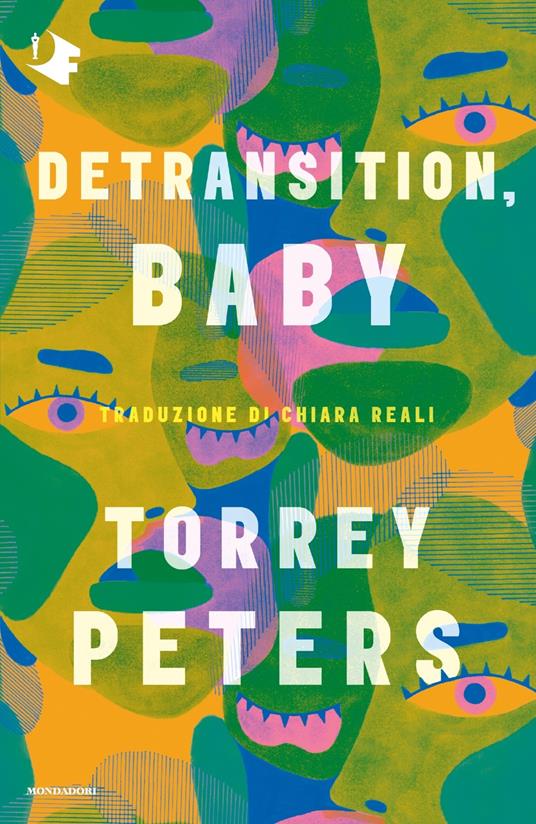betty@bookwyrm.social ha recensito Detransition, Baby di Torrey Peters
An excavation of the crevices of the human heart
4 stelle
I feel a need to start out by explaining that this is not my sort of book. Usually when books are not my sort of book, I simply do not read them. This one, however, engaged me sufficiently to pull me effortlessly through all the bits that were not shaped in a way familiar to me, which is very much to its credit.
The general shape of this book is as follows. Ames is living a somewhat boring (to me? But also to him, I think) job at an ad agency and having somewhat thrilling (to him, mostly) sex with his boss. (Probably the fact that this is self-evidently a bad idea adds to the thrill.) Until his boss calls him into her office to ask why she is pregnant when he had assured her he could not get her pregnant. He had been under the impression he could not, …
I feel a need to start out by explaining that this is not my sort of book. Usually when books are not my sort of book, I simply do not read them. This one, however, engaged me sufficiently to pull me effortlessly through all the bits that were not shaped in a way familiar to me, which is very much to its credit.
The general shape of this book is as follows. Ames is living a somewhat boring (to me? But also to him, I think) job at an ad agency and having somewhat thrilling (to him, mostly) sex with his boss. (Probably the fact that this is self-evidently a bad idea adds to the thrill.) Until his boss calls him into her office to ask why she is pregnant when he had assured her he could not get her pregnant. He had been under the impression he could not, because when he went on feminizing hormones, during the period of his life when he was a woman, he was told this would destroy his fertility. Katrina, his boss, wants to know if he will commit to raising the baby with her, as she plans to have an abortion otherwise.
Ames panics, torn between wanting to keep the baby and not wanting to commit (I think?) and proposes instead that Katrina raise the baby with Reese, his girlfriend back when he was a Amy, who has always desperately wanted a baby. Katrina has never met Reese, and also was not aware Ames was at any point a woman, and is fairly resistant to this idea but eventually agrees to consider it. Adding Reese to their somewhat messy relationship only makes it messier. Reese finds Ames' detransition suspect and perhaps ridiculous. Reese lives passionately, pursuing something indefinable, a wholeness she finds just out of her reach but searches for mostly in relationships with men who treat her badly.
None of this sounds like my jam. Furthermore, I found the book quite challenging because of its approach to its characters. This is a book that pries into the crevices of the human soul and finds the unlit and grotty chambers of the heart where pettiness and uncertainties and small meannesses hide, and contemplates them all with a faintly interested air that isn't cruel, but isn't exactly kind. I am aware of peoples' pettinesses and doubts and meannesses, as I am a people, but I do not particularly enjoy watching them catalogued. You might feel differently!
I feel I am talking too much about this book's stumbling blocks, for me, so the part I enjoyed:
This is a book that wants to look at how different women relate to womanhood.
The Sex and the City Problem wasn’t just Reese’s problem, it was a problem for all women. But unlike millions of cis women before Reese, no generation of trans women had ever solved it. The problem could be described thusly: When a woman begins to notice herself aging, the prospect of making some meaning out of her life grows more and more urgent. A need to save herself, or be saved, as the joys of beauty and youth repeat themselves to lesser and lesser effect. But in finding meaning, Reese would argue—despite the changes wrought by feminism—women still found themselves with only four major options to save themselves, options represented by the story arcs of the four female characters of Sex and the City. Find a partner, and be a Charlotte. Have a career, and be a Samantha. Have a baby, and be a Miranda. Or finally, express oneself in art or writing, and be a Carrie. Every generation of women reinvented this formula over and over, Reese believed, blending it and twisting it, but never quite escaping it.
Yet, for every generation of trans women prior to Reese’s, the Sex and the City Problem was an aspirational problem. Only the rarest, most stealth, most successful of trans women ever had the chance to even confront it. The rest were barred from all four options at the outset. No jobs, no lovers, no babies, and while a trans woman might have been a muse, no one wanted art in which she spoke for herself. And so, trans women defaulted into a kind of No Futurism, and while certain other queers might celebrate the irony, joy, and graves into which queers often rush, that rush into No Future looked a lot more glamorous when the beautiful corpse left behind was a wild and willful choice rather than a statistical probability.
This book very very much about how women related to womanhood or, if you prefer, "womanhood", that tricky beast. The book is incredibly insightful, on this one. There is a scene where Reese is surrounded by cis women at an 'essential oils party' that is genuinely hilarious. Reese's anthropological observations of the cis woman in her environment are absolutely spot on and very good.
It is also very written. Either you find this writing compelling, or you do not, but I definitely did:
Reese first came across Tammi at Saint Vitus, a dank club that primarily hosted music of the angry male variety. Every surface of the interior was painted black and therein such ample moshing had occurred over the years that the accumulated musk of sweaty post-adolescent boys forever lingered in the circulation-free air. A straight Tinder boy who was into noise had suggested meeting Reese there one night, and she agreed, primarily because she’d know immediately whether he was worth fucking or whether to flee after a drink, and either way, her apartment was two blocks away. Onstage, a cadre of boys hunched over keyboards. Among them, the only thing truly worth looking at in the whole club: a trans woman on guitar. Six foot three, tattoos jagged on lean porcelain arms, slashes of asymmetrical dark hair bisecting a face made up so expertly vampiric that had Elvira known about it, she’d have stopped by to learn something. The woman less played her instrument than throttled it every ten seconds or so, between which attacks she gazed with poised stillness at some unfixed point over the heads of the audience, listening to the reverberations of her own sudden violence, as a hiker who has shouted over an empty alpine lake holds quiet for the moments it takes his echo to return.
I am now going to dip into a thing that is not strictly book review: responding to other book reviews. It is not generally my custom! But a cursory skim of reviews on goodreads for this book reveal a number of people saying that the protagonist is a rapist, and I genuinely do not know what they are talking about. It is possible to write a sex scene that some people might feel was consensual if poorly negotiated, and other people might find non-consensual, but generally, if that happens, I at least know what sex scene people are talking about. There is a fair amount of sex in this book, not much of it closely described, some of it merely alluded to, so it's possible I missed the scene they are referring to. In fact, there is a great deal of sex that was, all things considered, probably ill-advised. But so far as I recall, there was no sex where everyone present did not want to be there! Some people had mixed feelings! But everyone wanted to be there more than they wanted to be elsewhere! Have a number of reivewers noticed some event I overlooked? This is possible. It is also possible these people... are terfs? I did not investigate closely, but it seems possible!



